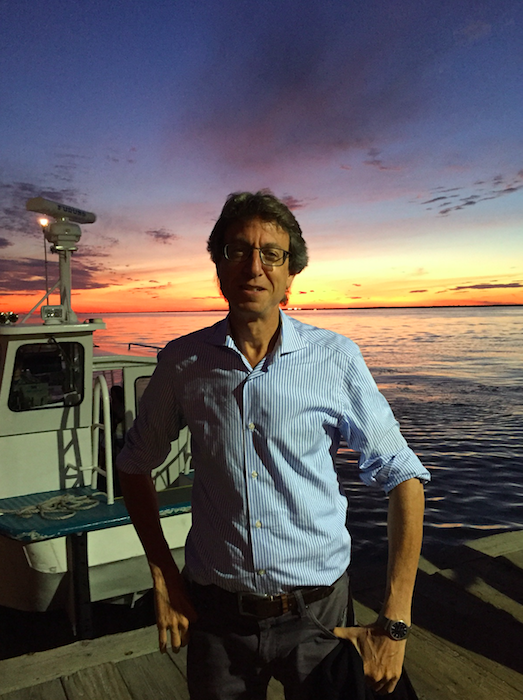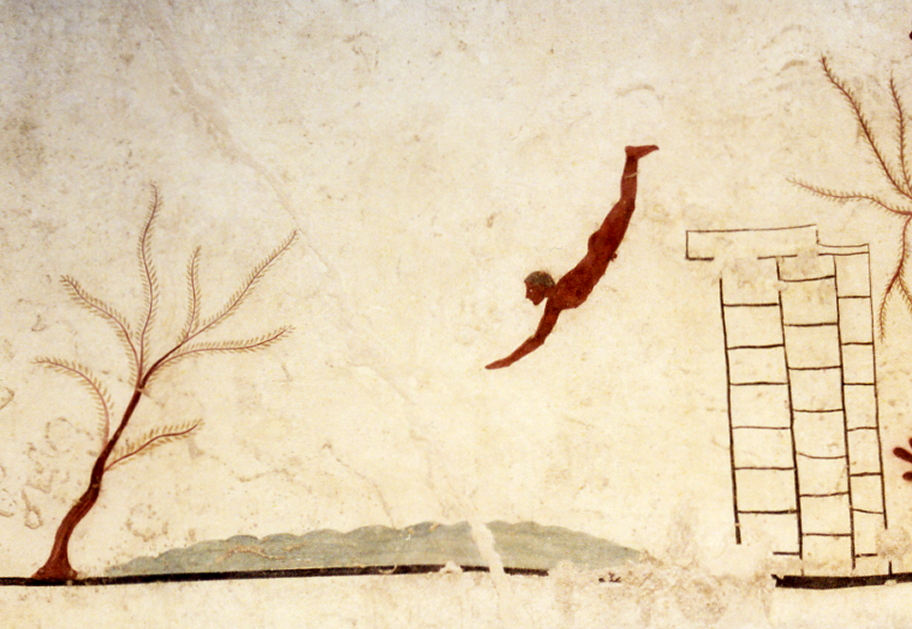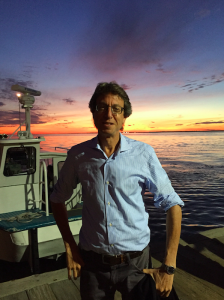
There aren’t many medicines available in our emotional cabinet that cure heartache. There’s the age-old remedy of time. That works, but oh so slowly and it never really seems that it’s working until it does. Another palliative is actual movement—whether it’s on a bike or a plane heading somewhere. For my recent and lingering heartache, I took up a friend’s offer to join him for three days on Fire Island, my first trip to the place, an oddity for a gay man in his 50s. During my entire stay there, I was haunted by “Aaron”, the man with whom I had been involved with for six months thinking that we were bonding as a committed couple of middle-aged men.
Fire Island I discovered is a haunted place, I think. Like a Civil War battlefield or a Nazi concentration camp or slave embarkation point, Fire Island has to be hallowed, haunted ground when you think of the legions of men who passed through there joyfully in their prime those few decades ago when the plague was at its worst and who passed on later. Many of them would wish to roam for eternity through the island’s quiet sun-faded wooden walkways edged with pines and the beach with its roiling surf that becomes a constant soothing background voice. I wanted my three-day stay to last that long, forever. My grief at losing a boyfriend I had begun to love of course does not begin to compare to the grief experienced by the survivors of gay men who perished in the 80s. But grief is grief and the setting for it is key.
As the ferry slid back from its dock in Sayville, I occupied one of the metal benches on the top deck. With the boat’s churning white wake trailing us, I became choked up because the simple experience of the trip on a sunny Monday morning in July was so beautiful, so effortless, that I regretted all the years I had shunned Fire Island, haughtily dismissing it as the destination for what I considered the undesirables . By the undesirables, I was actually referring to myself, thinking that I would be undesirable to all of the vain men who went there. When I was in my 20s, I thought, I can’t compete with the young men my age. They’ll shun me. I’m not pumped up that way, with biceps not ripe enough for tank tops. Though all it takes is a glance of yourself in a photo at that age to think: Oh, I was cute then. I reasoned then that I’ll never stand out there, a conclusion I stuck to like a religious zealot for decades.
But while I was on the island with my friend Isaac, I realized that it is actually the most inclusive place I have ever been. No one seemed shunned or shunning: An elderly man in a wheelchair I saw propelling himself down one of the walkways, a rainbow flag flapping from his handlebar; a man in Goth drag with enough nailheads and rivets to rival those used for the Empire State Building; green-dyed mustaches; rainbowed beards; “Bears” with their voluminous hairy stomachs bared for all to see as if they were on display at a petting zoo; and my friend Issac and I, attractive men who, perhaps, didn’t call out much attention.
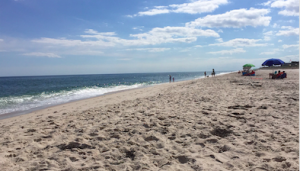
As the ferry made its way past islets of reeds and out into the choppy Great South Bay, Aaron was on my mind. Why is he not here to see something this beautiful, I thought. When the boat banged against the dock in The Pines and when I wheeled my bag along the planks of the walkway to my lodgings, he was with me. On the beach in the morning and at dusk, in the pool by day, and in the pool at night as the submerged lighting spookily changed the hues of the water, there he was. I wasn’t missing him but, rather, the idea of him and what I thought we were becoming together. When any of us break up, we’re usually sufficiently hurt by the person not to want him but just the ideal version of him that doesn’t and never did exist.
So desperate was I for some relief from the ache, which was really more an infusion of existential dread, a haunting in an already haunted place, that I had a frank talk with myself as I searched for a flawless seashell—which I decided to send to Aaron as a souvenir. That’s another one of the supposed self-prescriptive remedies for heartache: no contact with the person again. None. But I can’t do it. I am a writer and the only medicines I have stockpiled with no expiration dates are words. I write them down in a journal to make myself feel better. I send letters (real ones) to the (ex) boyfriend in question because I have to convey something to him—the hurt, the longing, the anger, my value, our value. I keep thinking that the right words— or the right souvenir— will right everything.
The surf is rough on Fire Island and I did not find a single whole shell on the expanse of beach between the Pines and Cherry Grove. So I reasoned that fragments of shells were just as beautiful as something complete, just as the way a few words of a Sappho poem are when they’re found on a scrap of papyrus in some vessel, or that ancient severed Roman statue found at Pergamon that reveals just the lips and part of a nose of a young man you can tell is lovely. Why are we only content with the whole and not a collection of partials?
I found a striated piece of clamshell, smooth as a thumbnail, somewhere between opaque and translucent, an abstract banding of pinks and browns and pearly whites, and I decided that is what I would send Aaron. I wrote him a note on a postcard atop the windy roof deck of the inn where my friend and I were staying, the bay on one side, the ocean on the other, all of the gray wooden houses in between. And I mailed it, explaining to the friendly postal clerk on duty what the note represented. He understood, a gay man himself, taking the time to pause in sorting out the bundles of rubber banded mail that lay on the floor and stare at my envelope.
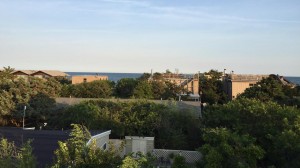
When you are in grief about a love that is not available to you, you talk and talk and talk some more to yourself to make yourself feel better. We have an inner therapist with us all the time. There are really two people with us always—ourself and that other self who addresses us. We’re never really alone. When I was in Rome the other week, eating dinner at an outdoor restaurant, feeling self conscious as the only sole diner, I heard that other self reciting to me that favorite line of Sophocles from which I derive some courage: Be who you want to seem.
Somewhere on Fire Island, mid-day, mid stay, I reached the accurate conclusion that the very values Aaron possesses are wholly different from mine. It was that simple. Partners will always have different interests, they should. But the values must be in sync. No exceptions to that rule. Aaron put on the Grindr mask, took safaris on Manhunt, and added himself to Craiglist list for sex apart from us with an indifference and frequency that necessitated my breaking the whole shell in which I thought existed.
Aaron received that shard of a shell I had found and the postcard—thanking me in a subsequent text. I studied the font and point-size of those text words he sent as if they revealed a hidden code of affection. The postcard I had chosen on which to pen my note was one of those 3-D kind where the image shifts with each tilt and showed a pair of wide-open eyes that blinked if you moved the card. Yes, treasured things shared between a couple—love, talk, desire, trust—really can end in a blink. But the eyes do open again to see something new. For me, it was Fire Island.
David Masello is a widely published essayist and poet who lives in New York.


